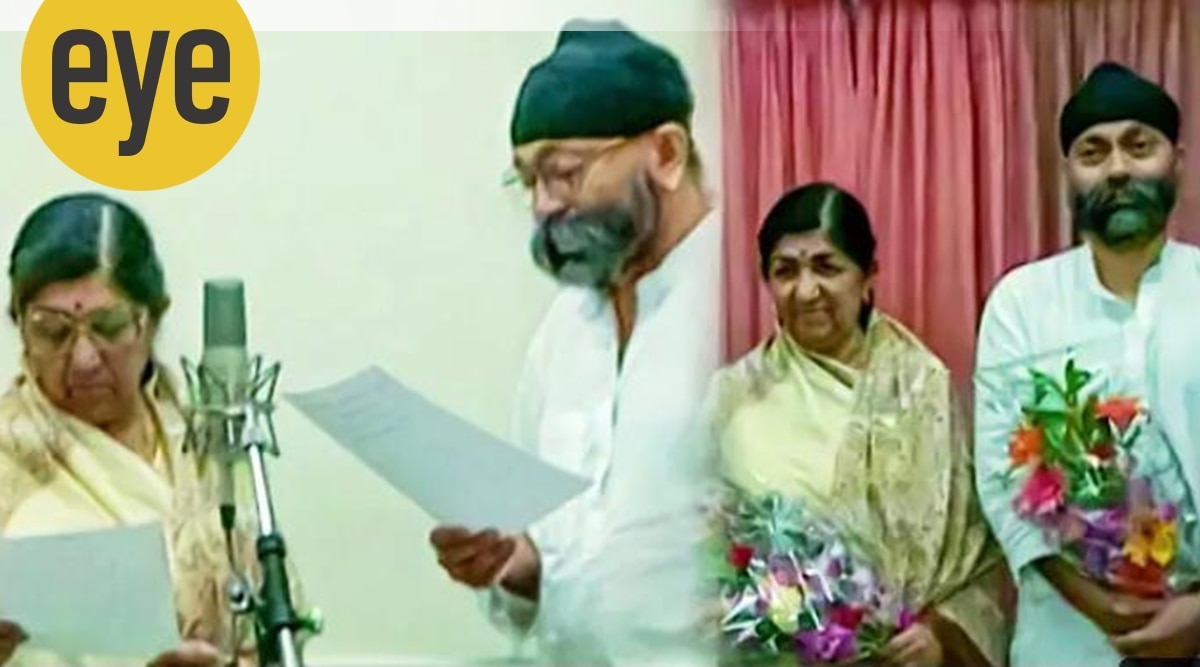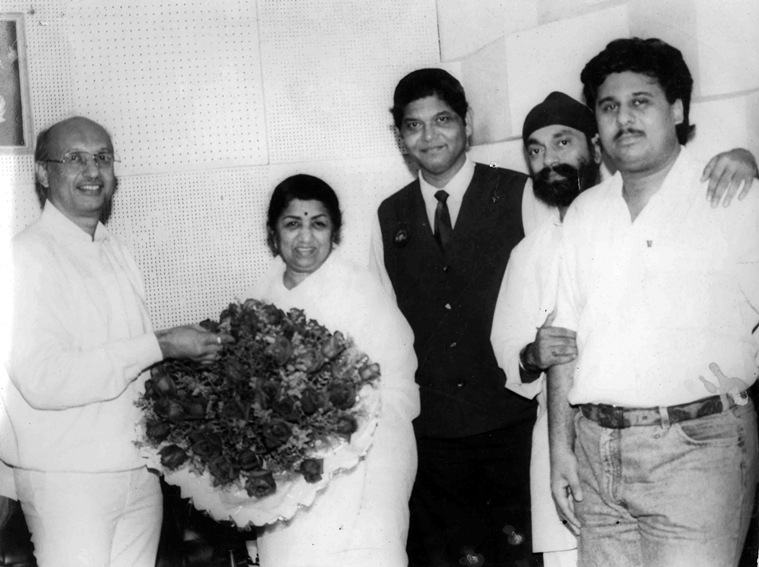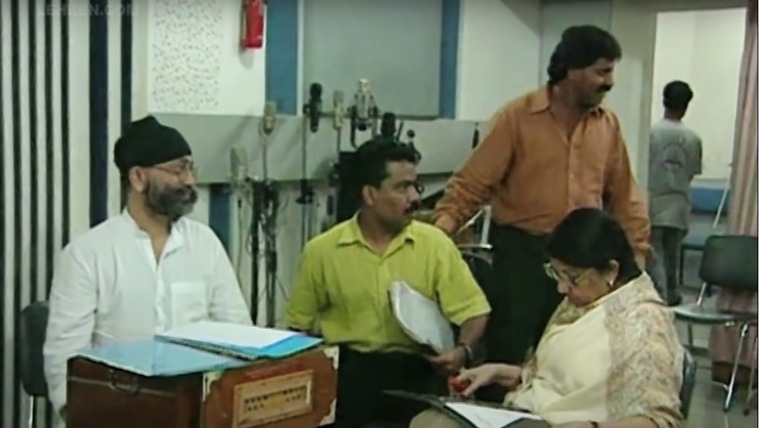Updated: February 12, 2022 6:22:54 pm
 Lata Mangeshkar with composer Uttam Singh at the song recording of Hum Tum Pe Marte Hain (1999). (Courtesy: Uttam Singh)
Lata Mangeshkar with composer Uttam Singh at the song recording of Hum Tum Pe Marte Hain (1999). (Courtesy: Uttam Singh) By Uttam Singh
When Rajshri Productions was making a comeback from the verge of extinction, after a string of flop films, with Maine Pyar Kiya (1989), starring newcomer leads Bhagyashree and Salman Khan, music director Raam Laxman (Vijay Patil) tasked me to persuade Lata didi to sing for the film. Since I began as a solo violinist in the Bombay film industry, in 1962, and later grew popular as an arranger, I’d built a rapport with Didi. When I went to her home, she said to me, “Main gaati nahin hoon (I don’t sing anymore).” We all knew; but I requested her to do it for me because I’d be arranging the music. After two minutes of silence, she agreed on one condition: “tum mujhe lene aaoge (you will come to pick me up)”. From there began our new chapter.
I’d drive from my Andheri home to her Prabhu Kunj residence on Peddar Road. She’d sit in the front seat, with two constables with guns at the back. Hum hanste-gaate studio pahaunch jaate thhe (We’d sing our way to the recording studio). Whether I was the composer or arranger on a film, and if Didi was singing in it, ferrying Didi became my duty. She’d never eat food from outside, even her tea arrived from home, but after the recordings, she’d demand a chilled soft drink, with extra ice cubes.
 (From left) Filmmaker Manmohan Desai, Lata Mangeshkar, music director Raam Laxman, music arranger Uttam Singh and director Ketan Desai on the sets of Anmol (1993). (Credit: Express Archive)
(From left) Filmmaker Manmohan Desai, Lata Mangeshkar, music director Raam Laxman, music arranger Uttam Singh and director Ketan Desai on the sets of Anmol (1993). (Credit: Express Archive) Saraswati didi, as I’d call her ne kisi ka likha kabhi nahin padha. She’d come into the studio with her music book, write down the song, and make corrections, sometimes three times over, while you were speaking, storing away everything in her memory, and that very moment the song became hers. Only when she was convinced, after rehearsals, would she step into the recording room. It’s a practice that had stuck from when Naushad sahab made her rehearse 40 times for a song, to my time, when after five-seven rehearsals the song was done in a single take. For her song with Mahendra Kapoor in Manoj Kumar’s Painter Babu (1983), Meenakshi Sheshadri’s Hindi-film debut and our first Hindi film as music directors Uttam-Jagdish (music-arranger duo Singh and Jagdish Khanna), we were recording live in the studio from 9 am-4 pm, with 120 musicians and 40 chorus; the first take only happened at 2 pm.
Then she sang for us in Ricky (1986), Waaris (1988), Clerk (1989), Dil To Pagal Hai (1997), Dushman (1998), and Hum Tum Pe Marte Hain (1999), among others. Lata didi remembered that we (Uttam-Jagdish) wanted to cut a private album with her. It kept getting pushed. Jagdish died in 1992, and I was busy arranging for Raam Laxman on Hum Aapke Hain Koun..! (1994). Eventually, a 12-song devotional album was cut for Tips record label, Om Sai Ram (1996), with two songs by her. After a sitar section in a piece that I made her listen to, she held my hand. She’d held my hand many times earlier, but in that moment, it felt like a blessing from goddess Saraswati. The affable Swar Kokila was large-hearted, too. She’d forgo her fee when a composer couldn’t afford to pay. For us, after her bhajan in Ricky, she’d said, “bhakti-bhaav se gaya (sang it out of devotion), won’t accept fee”.
 A screen grab of Lata Mangeshkar noting down the song as Uttam Singh sings it to her at the recording studio.
A screen grab of Lata Mangeshkar noting down the song as Uttam Singh sings it to her at the recording studio. There was a time in the industry, in the 1960s-’80s, when not just music directors and composers, but every single department wanted to have Lata didi sing in their film. At Mehboob Studio, I’ve myself overheard a group of lightmen wishing Lata di would sing. Now there can’t be two crafts or departments far removed from each other than set lighting and playback singing, and yet, everybody wanted Lata di, unka aura, unki shakhsiyat ka darja hi alag thha (her personality was on a different plane).
Directors and producers would wait for a whole year after their films were ready to have Lata di sing for them. I, too, waited for five-six months for her to sing Udja kale kawan in Gadar: Ek Prem Katha (2001), but she was abroad, so I signed on Alka Yagnik. In Dil to pagal hai, kisi aur ke hone ka sawaal hi nahin hota, it had to be Didi. In Arre re arre, when I asked her for another take of the second antara (verse), she said, “why, let’s do the whole song again”, and recorded, barefoot, standing for two-and-a-half hours.
She was everyone’s Didi, even director Yash Chopra’s. In my entire career, I’ve only heard two people in the industry address her as Lata: sound recordist BN (Badri Nath) Sharma (Madhumati, Mughal-E-Azam, Maine Pyar Kiya, etc.), who’d enquire after her throat/health from outside the recording room, “Lata, gala theek hai, kuchh paani-waani laaun?” and Lata-di would say, with a childlike guilt, “aaj (recording) nahin karte hain?” The other person to call her Lata was the legendary filmmaker V Shantaram.
She sang for great composers and while the compositions, like Lag jaa gale, were magical, she’d lift the songs further, with her enunciations, and also with her pauses and silences, she’d evoke myriad emotions in a single line. If a composer gave her 20 per cent of a song, or thought his composition was brilliant, Lata di would return it 100 per cent with heere, pukhraj (jewels) embedded in it.
The other day, while driving, the FM announced, “agla gaana Lata Mangeshkar ka…”, I rushed home and switched on the radio, I could have heard it on YouTube later, but the thrill of listening to her on the radio is irreplaceable. Without Didi, all these memorable songs won’t retain even 40 per cent of their charm. It’s a blessing to have done only a handful but good work; given a chance, I’d have composed for her till the very end. Among my compositions for her, a favourite is Mere pyar ki umar (Waaris).
Main nahin manta ki agar unse koi better singer hota… jo baat unme thhi, woh kisi mein nahin, woh khudaai, ruhaani awaaz (I don’t believe there could have been a better singer, the divinity in her voice wasn’t to be found anywhere). To take a dig at someone, especially after that person has passed on, is a chhichhori harkat (reprehensible behaviour). Nature doesn’t spare anyone, the power of one’s voice is bound to dim in old age. But when she called me after my son’s death in 2014, her voice sounded just the same that I’d been hearing for the past 40 years. No one till date has been able to even reach the road she has walked on. What she’s done musically hasn’t happened in the 1900s, isn’t happening now, and won’t happen even a 100 years later. She was God’s gift to us.
Uttam Singh was given the Maharashtra government’s ‘Lata Mangeshkar Award for Lifetime Achievement’ in 2016
As told to Tanushree Ghosh
- The Indian Express website has been rated GREEN for its credibility and trustworthiness by Newsguard, a global service that rates news sources for their journalistic standards.

